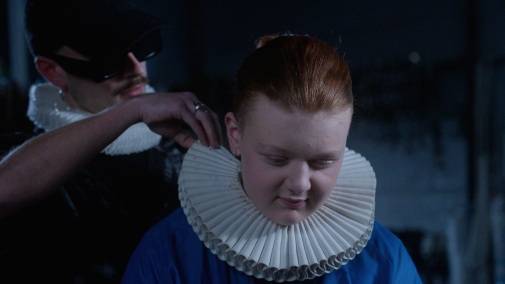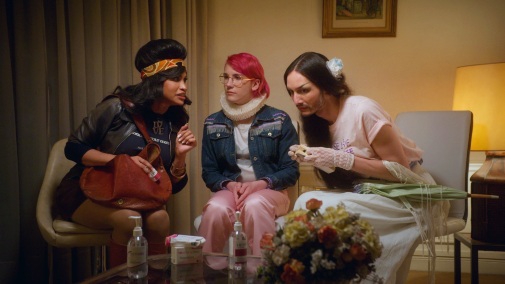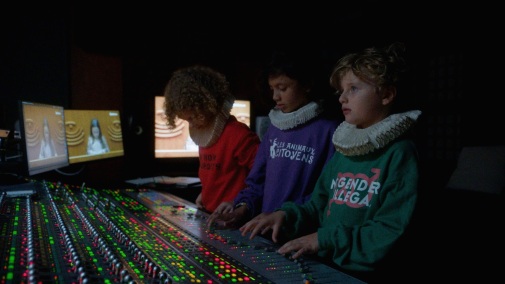Review: "Orlando, My Political Biography"
 Sunday, November 12, 2023 at 3:00PM
Sunday, November 12, 2023 at 3:00PM 
The future of cinema is in non-fiction. Though conventional narrative cinema still dominates the mainstream, it's within the documentary realm that the medium's most radical innovations tend to manifest, paving a path to the seventh art's tomorrow. That said, to consider cinema in binaries may be holding on to an outdated model. The way forward could entangle the cinema, as Iranian and Portuguese filmmakers have done for decades. In that regard, Orlando, My Political Biography is the future of cinema dressed in ruffs, non-binary, and transgressing past neat categorization.
Philosopher turned director Paul B. Preciado rejects structural dualities in search of something somewhere between academism and anarchic theater, a reflection of his and his subjects' essential queerness…
The world to come belongs to the new Orlandos. It is for them that you wrote your book, even without knowing it, and that I made this film.
Divided in a cascade of odd tableaux, Orlando, My Political Biography posits a radical appropriation of Virginia Woolf's seminal work about an Elizabethan noble living in constant youth for centuries, changing from male to female along the way. It was constructed in reference to the writer's paramour, Vita Sackville-West, and her family's aristocratic lineage, a sort of unorthodox love letter whose queer pedigree goes beyond its gender-bending hero's journey. For many a transgender reader, Orlando can be experienced as a biography through the looking glass. Or, at the very least, so it was for Preciado.
His film debut considers the novel and deconstructs it, playing as both a metaphysical correspondence between authors and as a staging of Orlando's story. Over twenty actors of varying gender identities take on the role, introducing themselves straight to the camera before performing Preciado's free literary adaptation. Unlike the figure in the novel, these Orlandos comprise a linear picture of aging, going from teenaged figures to elderly non-actors, circling back to children as visions of our collective queer hereafter. The gesture expands My Political Biography past Preciado's singular POV to embrace a plurality reflected in the picture's changing tones.

Take, for example, how Preciado and his circus of performers contemplate Orlando's conversation with Elizabeth I. To decontextualize the tale from its historical notions and give it a contemporary re-read, the monarch is transformed into a doctor who holds, in his hands, the judging, bureaucratic, verging on autocratic power to facilitate or block someone's transition. However, with Orlando multiplied in the waiting room, the character's permutations interact in solidarity, turning the clinical limbo into a literal dance party. On another occasion, Preciado will put the book under gender confirmation surgery for the picture's best and funniest visual.
The scalpel further manifests in invisible forces taking apart the novel's contradictions, its bounds to an unjust class hierarchy, and how a colonial mindset informs Orlando's transition beyond British borders. As the film goes on, the political aspect of the title comes to the forefront, diluting the connection to Woolf's work as Preciado and company enumerate and act out a series of systemic complications affecting trans people from now and before. It culminates in a euphoric court proceeding, presided by novelist Virginie Despentes in the role of a nameless but all-powerful judge, striking a note of shining hope that's bright enough to blind.
Coupled with an overwhelming sense of playfulness, these final notes contribute to the film's surprising accessibility. While moving within a world of academia and philosophy, Preciado isn't interested in presenting audiences with an inscrutable thesis-like film, aiming for a more welcoming property that's like the spoonful of sugar to help the medicine go down. Of course, this approach presents its own obstacles, with the propensity for repetition being a great source of frustration. It's the same points made over and over again, illustrated with slight textual variation and, for all the project's adventurousness, little audiovisual surprise.
Look back on the waiting room metamorphized into a discotheque, and you'll see how its depiction denounces a lack of formalist mastery over the medium. The camera is shy, even conventional, in how it approaches the subjects. It's a timidity at odds with Preciado's intellectual ambition, keeping the film from soaring to the highest heights in sight. In other words, I wouldn't call Orlando, My Political Biography "the first trans masterpiece" like scholar B. Ruby Rich did. Both because it's a dismissive view of trans cinema up to this point and because it overlooks the film's fragilities for hyperbole. Nevertheless, the 21st-century Orlando demands attention and consideration, if not as an aesthetic object, then as a political provocation intent on breaking binaries – gender, cinematic, sexual, social, structural, and many others.

Orlando, My Political Biography is currently in theaters, enjoying a limited release courtesy of Janus Films.



Reader Comments (2)
My #1 film of the year so far. Necessary watching.
Attractive topic. I would love to discuss this topic. Hope you will have more good articles. Retro bowl unblocked is a game for relaxing and having joy.